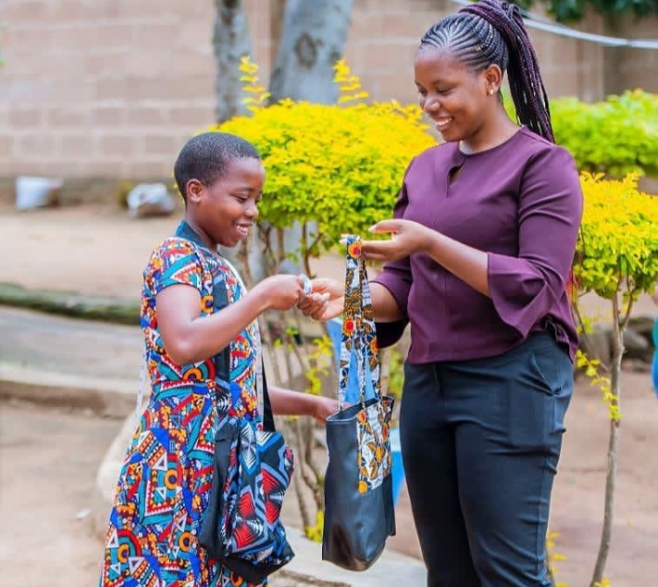Groundbreaking Workshop on AI and Technology-Facilitated Gender-Based Violence at AWiM24
Trending
Saturday May 31, 2025
Trending

Angela Benedicto talks to Fadhila Sadala of AWiM News about why she decided to establish an organisation in Tanzania tackling gender-based violence.
—
Growing up in Tanzania, Angela Benedicto always wanted to be a lawyer to defend human rights.
However, she had a passion to be a woman activist fighting for women’s and girls’ rights on the issue of gender-based violence (GBV) within the community.
“My purpose and goal is to reach a lot of people, especially women and girls,” she declares “and I want to ensure that they can say they have ever gone through gender-based violence in their lives.”
That dream is her current mission.
After secondary school, Angela joined the Open University of Tanzania for a degree in Law. In 2019, she fulfilled her childhood dream of becoming a lawyer.
She was among the few people from Tanzania who were awarded by the late Queen Elizabeth II for her contribution to community work.
The women rights activist was also awarded last year for 16 days of fighting GBV by WILDAF Tanzania as a champion of change.
“I was awarded a certificate of appreciation from Ilemela district in the Mwanza region of Tanzania in recognition of our contribution as activists in various social issues in the celebration of the African child,” she explained.
Wotesawa ( loosely translated from Swahili to mean all are equal) founded by Angelo in 2005 started of as an advisory committee for professionals working in domestic childcare with support from Kivulini Women’s Rights Organisation.
Now, reaching 17 years as an established non-profit organisation (NGO), Wotesawa’s vision and mission believe in a righteous and responsible society in which every young girl is free from all forms of abuse and exploitation.
Through legal and economic empowerment, child abuse monitoring, psycho-social support, and policy reforms in conformity with national and international child welfare standards, the organisation strives to empower and support current and former child domestic workers to understand, safeguard, promote and reinforce their rights in Tanzania.
Just as the director Angelo believes in ending GBV, the overall goal of Wotesawa is to reduce all forms of abuse and exploitation against girls in domestic care in Tanzania.
“Even though I studied law, I still enjoyed collaborating with the community especially women and girls by fighting the issues of gender-based violation, and with my organisation, I get to do just that,” the activist says.
According to UNICEF, there are 63 million girls who are exploited through labour.
When Angelo was a young girl, she was among the girls who experienced GBV when working as a housegirl: “When I was a little girl working as a domestic worker I got hit and tortured a lot, I hated experiencing it, and the thought of another girl being subjected to sexual abuse too, haunted me,” she states.
She adds: “ I decided to establish an organisation that will defend and protect the rights of girls in matters of sexual abuse.”
Sexual violence is rampant worldwide, especially in Tanzania, young girls are taken through human trafficking to work as domestic workers.
Angela adds that girls are even battered by their bosses.
Girls lose their lives, are raped, and endure child pregnancy against their will which can also lead to labour complications and at times loss of life during delivery.
“There are many incidences of child labour and early marriages too within the community,” the Wotesawa founder explains.
“I was not happy to see girls remain voiceless while experiencing sexual harassment, we need to step up and ensure the number comes down to zero,” Angela continues.
Under the organisation’s “Her education” programme, several young girls have been rescued from abuse and enrolled back in school.
Angela wants to continue to connect girls so they can inspire and support one another.
Participating in different programmes on child violence, and sexual abuse organised by Interpol and international organisations help more young girls and women to learn more about GBV, and exchange experiences with other survivors.
Currently, there are more projects which are going to be launched by Wotesawa and Interpol in Tanzania which aim to eradicate GBV.
“Together we can create a safer community where our voice is the strength we need to make a change,” Angela declares.
Having a joint debate with local chairmen, ward executives, welfare officers and also street chairman wards executives, and labour officers with the police desk, on gender and children Angela is eager to drive the point home and make a proactive change.
“Together we have a strategy and a plan to work on breaking the silence and reducing harassment of child girl domestic workers,” she says.
She organises seminars, conferences, and exhibitions of various products that help to educate and empower women, girls, and local communities about GBV.
In a 2019 report by JSI, in Tanzania, nearly one in three girls experience a form of sexual violence before the age of 18. Almost four in 10 women have experienced physical violence and one in five women over the age of 15 report having experienced sexual violence.
The state of GBV in Tanzania is dire and needs to be eradicated since it is used to abuse women from a very young age.
Through the work of Angela, the voices of young girls who have been silenced can be finally heard and their lives may be transformed for the better as GBV is put to a stop.
This article is part of the African Women in Media (AWIM) Graduate Trainee Programme in collaboration with Fojo Media Institute
We’re not gonna spam. We’ll try at least.

Copyright 2020. African Women In Media
Copyright 2020. African Women In Media
Recent Comments